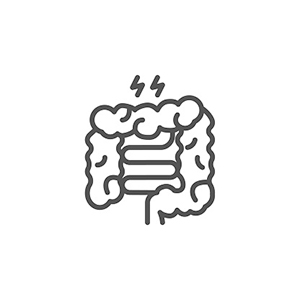In a retrospective analysis reported in JCO Oncology Practice, Grover et al found that enterocolitis flares occurred in approximately one-quarter of patients with preexisting inflammatory bowel disease (IBD) or microscopic colitis who received immune checkpoint inhibitors for the treatment of solid tumors.

Photo credit: Getty
Study Details
The study included data from 548 patients with solid tumors who received at least one dose of a programmed cell death protein 1 (PD-1)/programmed cell death ligand 1 (PD-L1) inhibitor, cytotoxic T-lymphocyte–associated antigen 4 inhibitor, or both at Brigham and Women’s Hospital/Dana-Farber Cancer Institute between 2011 and 2018.
Key Findings
Among the 548 patients, 25 (4.5%) were found to have preexisting colitis, including 21 with IBD and 4 with microscopic colitis. Median length of follow-up after immune checkpoint inhibitor initiation was 26.2 months.
Enterocolitis flare occurred in 7 patients (28%), including 3 (75%) of 4 patients with microscopic colitis and 4 (19%) of 21 with IBD (P = .05). The median time from immune checkpoint inhibitor initiation to onset of colitis flare was 7 weeks (range = 4–40 weeks).
The seven patients who experienced a flare had nine flare events, with one being grade 2 and eight being grade 3. Both patients who experienced two flares had underlying microscopic colitis, and neither had resumed immune checkpoint inhibitor therapy or was tapering off steroids at the time of the second flare; the second flare occurred at 20 and 63 days following the end of the first flare, respectively.
All patients with colitis flare were treated with systemic corticosteroids, with two requiring an anti–tumor necrosis factor agent and one requiring an anti-integrin agent and colectomy for refractory colitis.
Flare was observed in 5 of 22 patients receiving an anti–PD-1/PD-L1 agent alone (overall P = .07). No difference in risk was observed according to whether immune checkpoint inhibitors were used as first-line therapy vs second- or subsequent-line therapy (P = .63).
Immune checkpoint inhibitor therapy was discontinued in all patients who experienced a colitis flare. No associations were observed between immunomodulatory treatment (corticosteroids or steroid-sparing agents) for treatment of a flare and response to immune checkpoint inhibitor treatment (P = .42) or disease control (P = .07), or between development of flare and response to immune checkpoint inhibitor treatment (P = .64) or disease control (P = .07).
The investigators concluded, “In our cohort, exacerbation of enterocolitis occurred in a notable percentage of patients with IBD and a majority of patients with microscopic colitis, leading to discontinuation of immune checkpoint inhibitors. Although these data suggest that patients with cancer with preexisting IBD/microscopic colitis may be treated with immune checkpoint inhibitors, additional studies are needed to validate our results.”
Shilpa Grover, MD, MPH, of the Onco-Gastroenterology Program, Brigham and Women’s Hospital, is the corresponding author for the JCO Oncology Practice article.
Disclosure: For full disclosures of the study authors, visit ascopubs.org.

